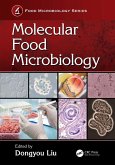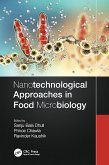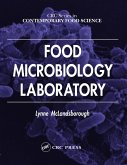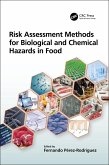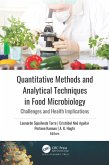

Alle Infos zum eBook verschenken

- Format: ePub
- Merkliste
- Auf die Merkliste
- Bewerten Bewerten
- Teilen
- Produkt teilen
- Produkterinnerung
- Produkterinnerung

Hier können Sie sich einloggen

Bitte loggen Sie sich zunächst in Ihr Kundenkonto ein oder registrieren Sie sich bei bücher.de, um das eBook-Abo tolino select nutzen zu können.
Maintaining the high standard set by the previous bestselling editions, this book presents the most up-to-date information in this rapidly growing and highly dynamic field. Revised and expanded to reflect recent advances, this edition broadens coverage of foodborne diseases to include many new and emerging pathogens, as well as descriptions of the mechanism of pathogenesis. With the inclusion of many more easy-to-follow figures and illustrations, this text provides a comprehensive introductory source for undergraduates, as well as a valuable reference for graduate level and working professionals in food microbiology or food safety.…mehr
- Geräte: eReader
- ohne Kopierschutz
- eBook Hilfe
- Größe: 21.27MB
![Fundamental Food Microbiology (eBook, ePUB) Fundamental Food Microbiology (eBook, ePUB)]() Bibek RayFundamental Food Microbiology (eBook, ePUB)94,95 €
Bibek RayFundamental Food Microbiology (eBook, ePUB)94,95 €![Molecular Food Microbiology (eBook, ePUB) Molecular Food Microbiology (eBook, ePUB)]() Molecular Food Microbiology (eBook, ePUB)68,95 €
Molecular Food Microbiology (eBook, ePUB)68,95 €![Nanotechnological Approaches in Food Microbiology (eBook, ePUB) Nanotechnological Approaches in Food Microbiology (eBook, ePUB)]() Nanotechnological Approaches in Food Microbiology (eBook, ePUB)65,95 €
Nanotechnological Approaches in Food Microbiology (eBook, ePUB)65,95 €![Handbook of Industrial Food Microbiology (eBook, ePUB) Handbook of Industrial Food Microbiology (eBook, ePUB)]() Manju NehraHandbook of Industrial Food Microbiology (eBook, ePUB)157,95 €
Manju NehraHandbook of Industrial Food Microbiology (eBook, ePUB)157,95 €![Food Microbiology Laboratory (eBook, ePUB) Food Microbiology Laboratory (eBook, ePUB)]() Lynne McLandsboroughFood Microbiology Laboratory (eBook, ePUB)75,95 €
Lynne McLandsboroughFood Microbiology Laboratory (eBook, ePUB)75,95 €![Risk Assessment Methods for Biological and Chemical Hazards in Food (eBook, ePUB) Risk Assessment Methods for Biological and Chemical Hazards in Food (eBook, ePUB)]() Risk Assessment Methods for Biological and Chemical Hazards in Food (eBook, ePUB)75,95 €
Risk Assessment Methods for Biological and Chemical Hazards in Food (eBook, ePUB)75,95 €![Quantitative Methods and Analytical Techniques in Food Microbiology (eBook, ePUB) Quantitative Methods and Analytical Techniques in Food Microbiology (eBook, ePUB)]() Quantitative Methods and Analytical Techniques in Food Microbiology (eBook, ePUB)130,95 €
Quantitative Methods and Analytical Techniques in Food Microbiology (eBook, ePUB)130,95 €-
-
-
Dieser Download kann aus rechtlichen Gründen nur mit Rechnungsadresse in A, B, BG, CY, CZ, D, DK, EW, E, FIN, F, GR, HR, H, IRL, I, LT, L, LR, M, NL, PL, P, R, S, SLO, SK ausgeliefert werden.
- Produktdetails
- Verlag: Taylor & Francis
- Seitenzahl: 663
- Erscheinungstermin: 26. November 2013
- Englisch
- ISBN-13: 9781482208658
- Artikelnr.: 58584049
- Verlag: Taylor & Francis
- Seitenzahl: 663
- Erscheinungstermin: 26. November 2013
- Englisch
- ISBN-13: 9781482208658
- Artikelnr.: 58584049
- Herstellerkennzeichnung Die Herstellerinformationen sind derzeit nicht verfügbar.
Arun K. Bhunia, BVSc, PhD, is a professor of molecular food microbiology in the Department of Food Science and also in the Department of Veterinary Comparative Pathobiology (Courtesy) at Purdue University, West Lafayette, Indiana. Professor Bhunia received his bachelor of veterinary medicine degree (1984) from Bidhan Chandra Krishi Viswa Vidyalaya (currently West Bengal University of Fisheries and Animal Sciences), West Bengal, India. He received his PhD (1989) from the University of Wyoming (USA) under the mentorship of Professor Bibek Ray and postdoctoral training (1995) from the University of Arkansas, Fayetteville, under the mentorship of Prof. Michael G. Johnson and then joined Alabama A&M University (Normal, Alabama) as an assistant professor in 1995. In 1998, he joined the Department of Food Science at Purdue University. He teaches three graduate level courses: Microbial Foodborne Pathogens (major topics: Mechanism of pathogenesis of foodborne pathogens and toxins and the host-parasite interactions); Microbial Techniques for Food Pathogen (a laboratory course that incorporates rapid methods employing immunoassays and genetic and biosensor tools), and codirects a graduate level journal club, Intestinal Microbiology and Immunology. In addition, he routinely lectures in courses such as Principles of Public Health (both undergraduate and graduate levels) on foodborne diseases, and Veterinary Microbiology and Mycology on several foodborne pathogens. Professor Bhunia's laboratory maintains a balanced research program (basic and applied) to address problems related to foodborne pathogens in the following areas: (a) pathogen and toxin detection; (b) understanding the mechanism of pathogenesis of enteric pathogens, including Listeria monocytogenes; and (c) application of bioengineered probiotics and natural antimicrobial peptides coupled with nanotechnology to control pathogens. His research has been funded by grants from the U.S. Department of Agriculture, National Science Foundation, National Cattleman's Beef Association, National Institute of Health, and Center for Food Safety Engineering.


